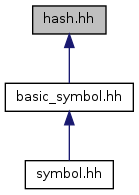definition of the basic hashing functor More...
#include "utilmm/config/config.h"#include <string>#include "utilmm/hash/hash_fwd.hh"#include "utilmm/hash/bits/hash.tcc"
Include dependency graph for hash.hh:

This graph shows which files directly or indirectly include this file:

Go to the source code of this file.
Classes | |
| struct | utilmm::hash< Ty > |
| hash functor More... | |
| struct | utilmm::hash< bool > |
| struct | utilmm::hash< char > |
| struct | utilmm::hash< double > |
| struct | utilmm::hash< float > |
| struct | utilmm::hash< long double > |
| struct | utilmm::hash< signed char > |
| struct | utilmm::hash< signed int > |
| struct | utilmm::hash< signed long int > |
| struct | utilmm::hash< signed short int > |
| struct | utilmm::hash< std::basic_string< CharT, Traits, Alloc > > |
| struct | utilmm::hash< Ty * > |
| struct | utilmm::hash< unsigned char > |
| struct | utilmm::hash< unsigned int > |
| struct | utilmm::hash< unsigned long int > |
| struct | utilmm::hash< unsigned short int > |
Namespaces | |
| namespace | utilmm |
Defines | |
| #define | IN_UTILMM_HASH_HEADER |
Detailed Description
definition of the basic hashing functor
This header defines the utilmm::hash functor and some specialization of this one to some standard types.
To define your specialization to a class foo user can do like in the following example :
- file foo.hh
namespace foo_ns { class foo { // [...] }; // class foo_ns::foo }
- file foo.cc
#include "utilmm/foo.hh" #include "utilmm/hash/hash.hh" size_t utilmm::hash<foo_ns::foo>::operator()(Ty const &x) const { // Insert hashing code here }
Definition in file hash.hh.
Define Documentation
| #define IN_UTILMM_HASH_HEADER |